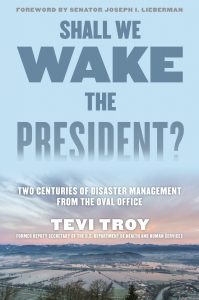Get an in depth look at the presidency dealing with disaster in “Shall We Wake the President?”
You were, of course, asleep when the alarm sounded.
Why do these things always happen at 3 a.m.? Emergencies never happen during the day. You can’t schedule them, either, so you need to be at least semi-prepared for anything, all the time. But is the government ready? In “Shall We Wake the President?” by Tevi Troy, you’ll find the answer.
Hurricanes, conflagrations, tornadoes, terrorism. Does it seem like there’ve been more disasters in the United States lately, or are we just more aware of them?
Both, says Tevi Troy.
Why do these things always happen at 3 a.m.? Emergencies never happen during the day. You can’t schedule them, either, so you need to be at least semi-prepared for anything, all the time. But is the government ready? In disaster by Tevi Troy, you’ll find the answer.
Hurricanes, conflagrations, tornadoes, terrorism. Does it seem like there’ve been more disasters in the United States lately, or are we just more aware of them?
Both, says Tevi Troy.
Inclement weather, epidemics, war, and destruction are as old as mankind but the world itself is more complicated than ever. We have better technology, for instance, which informs but may not fully prepare us for worst-case scenarios, and full-scale prevention may be impossible. Sometimes, the best we can hope is that our Commanders-in-Chief are ready for what befalls us, although, as Troy notes, unseasoned new presidents are often inexperienced in dealing with major disasters.
They can, however, look at the past for a basic disaster management blueprint; many of their predecessors dealt with similar occurrences throughout history. Presidents can take stronger leadership roles or even an advisory role, if a different level or department of government is more suited or better braced to take the reins. At the very least – and perhaps first – a president must loosen the strings tying communication, and reassure his or her people.
Even so, and though we lay many expectations at the feet of our government, Troy says most Americans would be well-served to serve themselves.
Because the government doesn’t have a nation-wide stockpile of food or water, create your own. Since there may be difficulty getting medicines everywhere, get vaccinated, take basic hygienic precautions, and have a well-stocked medi-kit. Pay down your debts. Consider buying a generator, and some sturdy locks.
And finally, keep in mind that while there are things you can’t guard against, you also can’t spend your life worrying. All things considered, your chances of being a victim are relatively low.
Wow. “Shall We Wake the President?” is quite the surprise.
I expected to see history in this book, which author and former Deputy Secretary of the Department of Health& Human Services Tevi Troy offers, and it’s very eye-opening. I didn’t expect the behind-the-scenes politics, nor the touch of survivalist advice in this book – even though I came to welcome both.
It’s easy to complain about shortcomings in disaster mitigation, but merely knowing why help may not be coming if the unthinkable happens is a great way to be forearmed; to that end, Troy explains why the system is what it is. That’s a good education for readers who want to dive deeply into this book; of even more help is the no-nonsense tone and the quietly urgent advice.
The anniversary of 9/11 has just passed, and if that and other current events have you on watch, then this ponderously thoughtful book will keep you reading. Buy “Shall We Wake the President?” and be prepared, not alarmed.





